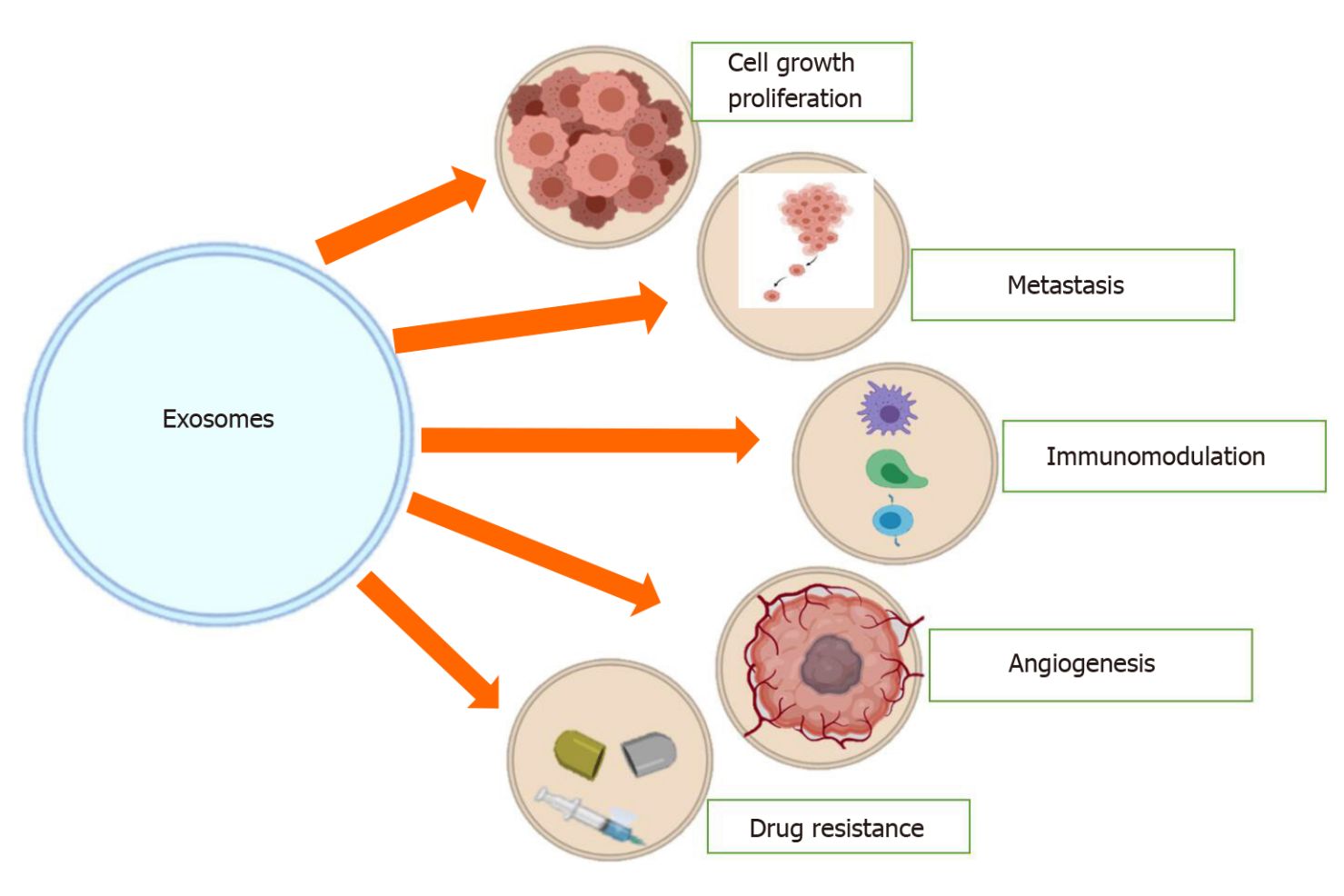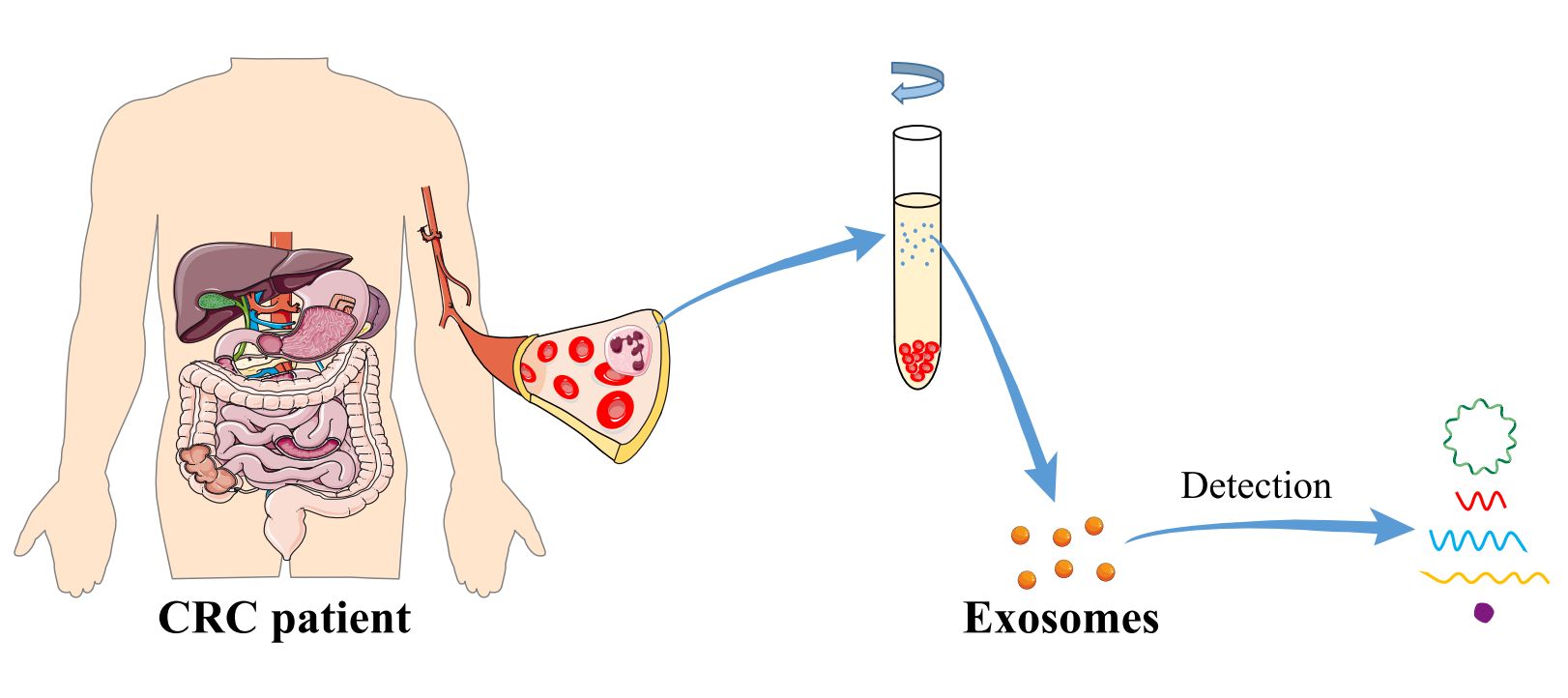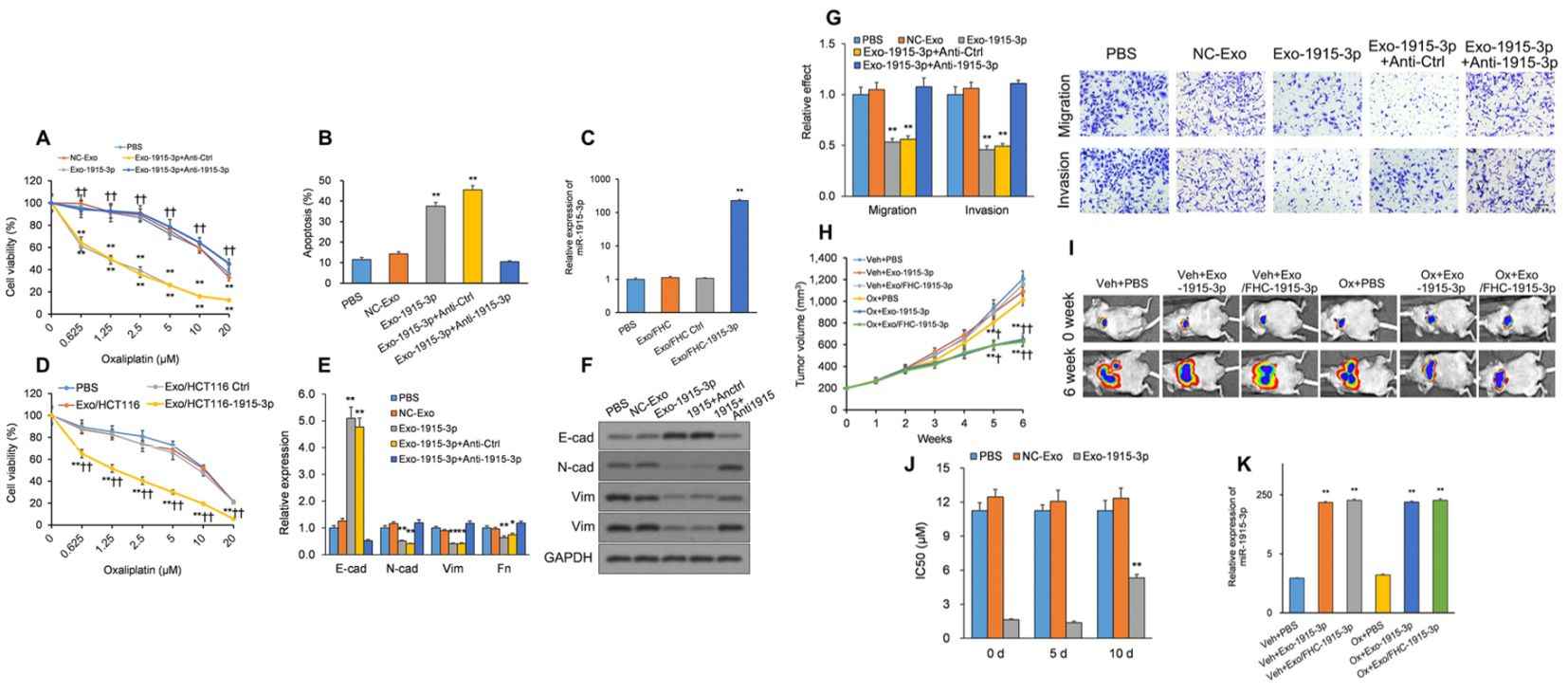Exosome Research in Human Colorectal Carcinoma
Continuous crosstalk between the environment and cancer cells is necessary for tumor growth and systemic dissemination. This connection can occur through direct contact and the secretion of extracellular vesicles (EVs). Exosomes are 30-150 nm phospholipid bilayer vesicles that transport biologically active molecules such as RNA, DNA, and proteins. Tumor-derived exosomes deliver oncogenic factors to recipient cells and the surrounding environment, promoting proliferation and angiogenesis of target cells, and leading to cancer progression.
How do Exosomes Promote Colorectal Carcinoma Progression?
Colorectal carcinoma (CRC) is a prevalent and deadly form of cancer, posing a significant threat to global health. The discovery of exosomes isolated from CRC cells has shed light on the complex mechanisms underlying the progression of this malignancy. These tiny vesicles have been found to play a pivotal role in promoting CRC advancement by modulating key regulatory genes, enhancing cancer cell proliferation, inhibiting apoptosis, and manipulating various signaling pathways. Moreover, extensive research has established a direct correlation between exosomes derived from CRC cells and the induction of epithelial-mesenchymal transition (EMT) and angiogenesis, two critical processes implicated in cancer progression. Furthermore, the dysregulated expression of exosomal circular RNA (circRNA) has emerged as a key player in driving CRC metastasis and conferring resistance to standard anticancer therapies.
 Figure 1. Schematic of the roles of tumor cell-derived exosomes. (Umwali Y, et al., 2021)
Figure 1. Schematic of the roles of tumor cell-derived exosomes. (Umwali Y, et al., 2021)
Exosomes as a Potential Source of CRC Biomarkers
Special properties, such as the ability to load specific miRNAs, stability in blood, reproducible assays, and especially the ability to reflect the characteristics of cancer cells, make exosomes an essential tool for designing highly sensitive diagnostic strategies for rapid, non-invasive monitoring of cancer progression. Recent research on exosomes from CRC patients has shown significant differences in several miRNAs, lncRNAs, and proteins from normal controls. The miR-23a, miR-1246, and miR-21 expression are higher in plasma exosomes from CRC patients, and increased miR-6803-5p has been suggested as a potential diagnostic indicator. Elevated levels of exosomal miRNA-19a in serum are a sign of CRC recurrence. These results demonstrate the promising application of exosomal miRNAs in diagnosing CRC. lncRNA CRC differentially expressed-h (CRNDE-h), which is overexpressed in the serum exosomes of CRC patients, may also be used as a potential biomarker. In addition, heat shock protein 60 (Hsp60) is a promising candidate for colorectal cancer diagnosis.
 Figure 2. Blood exosomes as diagnostic biomarkers in CRC. (Xiao Y, et al., 2020)
Figure 2. Blood exosomes as diagnostic biomarkers in CRC. (Xiao Y, et al., 2020)
Exosomes for CRC Nanotherapy
Emerging therapeutic strategies using nanomedicine approaches offer great advantages for improving drug bioavailability, avoiding drug resistance, and reducing side effects and toxicity. In this regard, the potential use of engineered exosomes is receiving increasing attention. Biocompatibility, stability in circulation, and the ability to penetrate deep tissues and plasma membranes make exosomes appropriate candidate nanocarriers for therapeutic drugs.
- Steps
1. Isolate exosomes from cell lines treated with chemotherapeutic agents.
2. Select vectors that allow overexpression and packaging of nucleic acids and proteins.
3. Load exosomes using mechanical methods (sonication, electroporation, extrusion, and incubation).
4. Further engineering improvements (genetic engineering, chemical, and physical modifications) to increase the targeting of exosomes.
- Case
Oxaliplatin is an essential component of combination chemotherapy for advanced CRC. However, resistance due to EMT makes oxaliplatin treatment limited. It has been found that oxaliplatin-resistant CRC cell lines exhibit differential expression of miR-1915-3p. Therefore, this microRNA may be a potential factor contributing to drug resistance. Researchers transduced miR-1915-3p by lentivirus for overexpression in drug-resistant CRC cells and non-tumorigenic enterocyte cell lines (FHC). Isolate exosomes from transduced FHC cells and co-incubated with CRC cells. The effect of miR-1915-3p on CRC viability is assessed by RT-qPCR, western blot, proliferation apoptosis assay, and Transwell assay. It is found that exosome delivery of miR-1915-3p enhances the chemotherapeutic efficacy of oxaliplatin in CRC cells by inhibiting EMT.
 Figure 3. Increased sensitivity to oxaliplatin following EV-based miR-1915-3p delivery. (Xiao Z, et al., 2021)
Figure 3. Increased sensitivity to oxaliplatin following EV-based miR-1915-3p delivery. (Xiao Z, et al., 2021)
We are dedicated to advancing the field of cancer research through the development and marketing of top-quality exosome products. By providing exosomes isolated from cancer cell lines, we can offer clients a valuable resource for exploring new treatments for CRC.
| Cat No. | Product Name | Source |
| Exo-CH16 | HQExo™ Exosome-COLO1 | Exosome derived from human colon carcinoma (COLO1 cell line) |
| Exo-CH22 | HQExo™ Exosome-HCT116 | Exosome derived from human colorectal carcinoma cell line initiated from an adult male (HCT116 cell line) |
| Exo-CH10 | HQExo™ Exosome-HCT116 | Exosome derived from human colorectal carcinoma cell line (HCT116 cell line) |
| Explore All Exosomes Isolated from Human Colorectal Carcinoma | ||
Creative Biostructure is committed to excellence in biological research, ensuring that our products meet the highest quality standards and providing researchers with the appropriate tools to make breakthrough discoveries in the fight against cancer. If you are interested in our products, please feel free to contact us. Partner with us to unlock the potential of exosomes in colorectal carcinoma treatment.
References
- Umwali Y, et al. Roles of exosomes in diagnosis and treatment of colorectal cancer. World J Clin Cases. 2021. 9(18): 4467-4479.
- Xiao Y, et al. Exosomes as potential sources of biomarkers in colorectal cancer. Cancer Lett. 2020. 476: 13-22.
- Xiao Z, et al. EVs delivery of miR-1915-3p improves the chemotherapeutic efficacy of oxaliplatin in colorectal cancer. Cancer Chemother Pharmacol. 2021. 88(6): 1021-1031.
- Kotelevets L, Chastre E. Extracellular Vesicles in Colorectal Cancer: From Tumor Growth and Metastasis to Biomarkers and Nanomedications. Cancers. 2023. 15(4): 1107.
- Titu S, et al. Exosomes in Colorectal Cancer: From Physiology to Clinical Applications. Int J Mol Sci. 2023. 24(5): 4382.